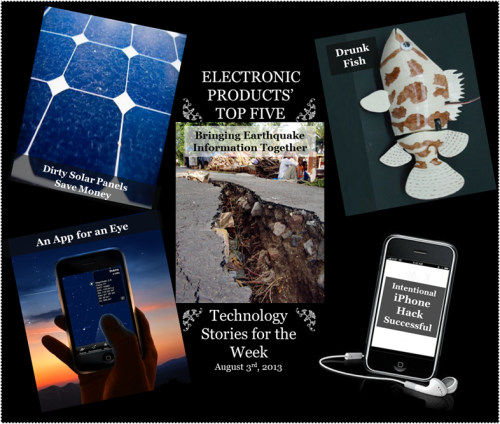Of all the extraordinary technology discoveries made every week, we never thought one would include intoxicating a zebra fish to study its effects on feelings of fear, or intentionally hacking an iPhone though an innocent looking charger, or the invention of an app to help the blind.

Read on to learn the top five technology stories for the week of August 2, 2013!
An App for an Eye
Smartphone app assists the blind
For those suffering from the disease nyctalopia, or “nighttime blindness”, there may be a solution in the near future, thanks to Pakistani researchers from the Federal Urdu University of Arts, Science, and Technology in Karachi. The researchers have developed a smartphone app that keeps track of a user’s location and the distance they have walked from home. So if the sun sets, the app will calculate how long it will take them to get to their destination and when they should start heading home. It also comforts the user by telling them how many minutes there are before it gets dark.
Drunken Fish
Alcohol reduces a fish’s fear of a robotic fish
A new study from a team at the Polytechnic Institute of New York University focused on the fear fish feel when they see a robotic fish, and how that fear can be altered by alcohol. The experiment uses zebra fish and shows how the use of ethanol and alcohol calms them down in times where they realize that the robotic fish isn’t actually one of their kind. This study hopes to find new procedures to understanding the chemicals behind anxiety and other emotions, and the substances that eliminate or heighten those feelings.
Dirty Solar Panels Save Money
Researchers urge homeowners to not pay for cleaners
Solar panels are the first thing that comes to mind when we think of renewable energy and many systems are making their way onto roofs all over the country. But University of California, San Diego engineers are urging solar panel users not to waste the money on cleaners to come and dust off their solar panels. The team worked with solar panels that had not been rained on or cleaned in 145 days during a drought, and they only lost 7.4% of their efficiency. Researchers say homeowners simply won’t get their money’s worth hiring someone to clean them.
Bringing Earthquake Information Together
New data hub is home to all earthquake studies
Researchers at the Network for Earthquake Engineering Simulation (NEES) at Purdue University have developed a program online to help earthquake research progress. Cyberinfrastructure is software that serves as a central database for experimental results that will be available for all researchers, educators, and practitioners. Cyberinfrastructure includes high-speed networks, laptops, servers, and software to create a NEEShub with over 1.6 million projects so far. This will help give researchers the resources to conduct studies and experiments to learn more about earthquakes.
Intentional iPhone Hack Successful
Researchers hack iPhone through charger and app
A team at Georgia Tech Information Security Center found two security soft spots in Apple’s mobile devices. Apple put an app review process into place so users can only use apps that they approve. But, with a Trojan Horse-like approach called Jekyll, the team rearranges codes and once it is accepted by the user, it can perform tasks such as tweet, take pictures, and send emails and texts. The team decided to dig a little deeper and discovered that the iPhone can be hacked through an iPhone charger that looks just like a regular store-bought charger. Apple was notified of these discoveries.
Advertisement
Learn more about Electronic Products Magazine





